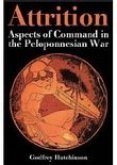This new study by a respected historian provides a unique narrative of the Peloponnesian War, a monumental conflict between Athens and Sparta that raged for 27 years across the Greek world. The conflict's resulting destruction of cities, mass enslavements, and loss of human life - in short, the horrors of war - bears strong resemblance to the violence of modern war from the Western front to Vietnam. Despite these common factors, little attention has been paid to the contemporary nature of the Peloponnesian War, and its impact on the society and culture of the time. Incorporating an original interpretation of how and why the war developed, and a perceptive analysis of its conduct, Tritle weaves in the contemporary evidence of Aristophanes and other dramatists to illustrate how war affected the average Athenian. He discusses the effect of the violence on both the individual and society, in the light of modern understanding of the impact of the brutality of war. He also describes how, despite the conflict, Athens witnessed a blossoming of culture and intellectual achievement, including the plays of Sophocles and Euripides, and the philosophical questioning of Socrates.
"Tritle's overall aim is to make the content and context of thePeloponnesian War more accessible to those unfamiliar withclassics, and on the whole I believe he succeeds. His tonethroughout is quite relaxed...but for those unfamiliar withclassical Greek history and/or the Peloponnesian war Tritle's bookis a good starting place." (Bryn Mawr Classical Review,December 2010)
"He has produced a major new account of the Peloponnesian War thatwill allow readers of Thucydides to feel what it was actually liketo be at war and to understand the breakdown of legal, moral, andpolitical principles that caused prolonged human suffering on sucha colossal scale. We are in his debt.." (Michigan War StudiesReview, 2 October 2010)
"Recommended. Undergraduate libraries and above". (Choice, 1November 2010)"An insightful, highly readable history of the first all-outwar in western history. Tritle knows Greek history and he knowswhat war does to soldiers and civilians alike."
Tom Palaima, University of Texas at Austin
"Not another paraphrase of Thucydides, Tritle's sensitivenew history of the great war between Athens and Sparta marshals theliterary and material evidence to explore the human and societalexperience, showing once again that military history extends farbeyond the battlefield."
Waldemar Heckel, University of Calgary
"Swift narrative, mastery of modern scholarship, andunusual integration of classical literature. Like his great sourceThucydides, the author was a soldier, and the terrible brutality ofwar is immanent."
Mortimer Chambers, UCLA
"By helping us understand broadly and deeply the human andsocial dimension of this war, Tritle's book brilliantlyjustifies its ambitious title of a 'new history' of anoften-treated old war."
Kurt A. Raaflaub, Brown University
"He has produced a major new account of the Peloponnesian War thatwill allow readers of Thucydides to feel what it was actually liketo be at war and to understand the breakdown of legal, moral, andpolitical principles that caused prolonged human suffering on sucha colossal scale. We are in his debt.." (Michigan War StudiesReview, 2 October 2010)
"Recommended. Undergraduate libraries and above". (Choice, 1November 2010)"An insightful, highly readable history of the first all-outwar in western history. Tritle knows Greek history and he knowswhat war does to soldiers and civilians alike."
Tom Palaima, University of Texas at Austin
"Not another paraphrase of Thucydides, Tritle's sensitivenew history of the great war between Athens and Sparta marshals theliterary and material evidence to explore the human and societalexperience, showing once again that military history extends farbeyond the battlefield."
Waldemar Heckel, University of Calgary
"Swift narrative, mastery of modern scholarship, andunusual integration of classical literature. Like his great sourceThucydides, the author was a soldier, and the terrible brutality ofwar is immanent."
Mortimer Chambers, UCLA
"By helping us understand broadly and deeply the human andsocial dimension of this war, Tritle's book brilliantlyjustifies its ambitious title of a 'new history' of anoften-treated old war."
Kurt A. Raaflaub, Brown University








